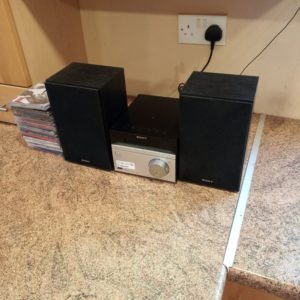1.Beware of everyday noise
Howard Leight by Honeywell 1030111 Noise Blocking Stereo Earmuff – Black
Excessive noise exposure damages the delicate hair cells in the inner ear.
This damage often results in permanent hearing loss and tinnitus (ringing of the ears).
Hazardous noise exposures can occur on the job, but also is common in recreational activities.
Hearing loss prevention thus requires diligence and sensitivity to situations where hearing can be put at risk.
The rule of thumb for loud noises is that they shouldn’t exceed 85 decibels (you can compare that to the same noise level as busy city traffic).
Hair dryers, blenders, coffee grinders, lawn mowers, and iPods all can individually exceed this limit daily and damage your hearing.
When drying your hair, use the lowest setting and wear earplugs.
For your blenders and grinders, cover the base with a kitchen towel to muffle the noise.
When mowing the lawn, wear foam inserts or earmuffs.
When listening to your iPod, maintain a low volume, try to limit your use to an hour a day, and use either noise-cancelling or sound-isolating earbuds.
2.Prepare for environmental noise
Bio Ears Soft Silicone EarPlugs Protection – 3 Pairs
Concerts, fireworks, and sporting events are damaging because most people don’t prepare for them.
Bring earplugs when going to an event that you know will be noisy, such as a crowded parade or a concert.
Be alert to some of these warning signs, which could suggest that you’ve been exposed to hazardous noise:
You hear ringing or buzzing (tinnitus) in your ears after exposure to noise.
You notice that you can hear people talking, but you have difficulty understanding them, after exposure to noise.
You experience “fullness” in your ears after leaving a noisy area
3.Watch for health problems that put your hearing at risk
People with high blood pressure, high cholesterol, diabetes, or other chronic conditions have a higher risk of suffering from hearing loss.
As for diabetes, controlling one’s blood pressure and keeping up with regular insulin and diabetes medication will help maintain your ears’ functions.
4.Don’t overlook earwax
This might seem like a trivial problem, but earwax buildup can clog your ears and cause you to temporarily lose hearing.A buildup of wax in your ears can muffle sound.
But don’t use a cotton swab to clean them out — they can push wax even deeper into your ear canal. Instead, use an at-home irrigation kit to soften wax and gently wash it out.
5.Allergies aren’t doing your ears any favors
Blocked sinuses caused by colds and allergies can cause temporary hearing loss when the tube in your ear that regulates pressure swells shut.
See your doctor to get the proper medication to control your allergies in order to keep your middle-ear area from collecting fluids.
6.Whatever you do, don’t ignore the problem
As soon as you hear ringing in your ears, go see your doctor.
Keep an “eye” on your hearing – see a hearing health professional routinely for hearing testing, or if offered through your employer, ensure you know your hearing test results and track it year-to-year.
7.If you work in an at-risk occupation
Check with your employer to make sure that your jobsite has an effective program to adequately protect your hearing, meeting federal or state regulations.
8.Be a Quiet Enforcer
Turn down the background noise level in your life by buying appliances and devices that have low noise ratings.
If the noise is too loud in the gym, movie theater, restaurant or bedroom,ask the person in the room to turn it down.
9.Don’t Smoke
Nicorette Quickmist Duo Nicotine Mouthspray 1 mg
Along with age and noise, research has shown that tobacco can increase a person’s risk for hearing loss. If you smoke, preserving your hearing is one more good reason to quit.
If you aren’t a smoker, avoid breathing secondhand smoke.
10.Don’t have your television, radio or music on too loud
This is particularly important if you have young children in the house, because their ears are more delicate than an adult’s.
If you can’t have a comfortable conversation with someone who is two metres (about 6.5ft) away from you, turn the volume down.
You shouldn’t have dull hearing or ringing in your ears after listening to music.
11.Use headphones
Rather than turning up the volume.
You can buy add-ons for your existing headphones that block out more outside noise, or noise cancelling headphones.
12.Protect yourself from traumatic head injury
Prowell F59 Cycle Helmets (Matt Black, Large)
Suffering a blow to the head can lead to hearing loss, temporarily or permanently.
Make sure you are taking the proper precautions to protect your head while biking, skating, skateboarding, riding a motorcycle or scooter, or doing anything else that might lead to a head injury.
13.Control fevers
Diseases that cause high fevers, such as meningitis, can damage your cochlea and impair hearing.
If you have an illness accompanied by high fever, take measures to control the fever as much as you can.
For temperatures above 102°F (38.9°C), you can take acetaminophen or ibuprofen to help bring down the fever.
If you have any information,questions, or feedback you would like to include in this webpage.
Please email momo19@diabetessupportsite.com or leave your comments below.






